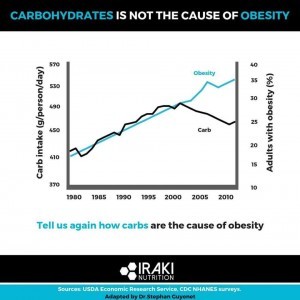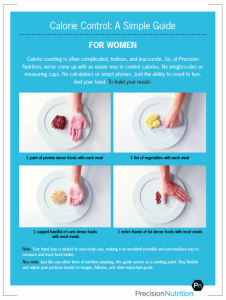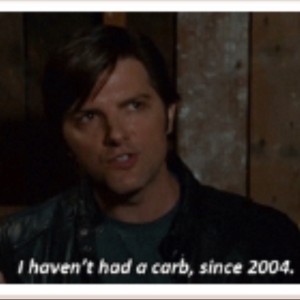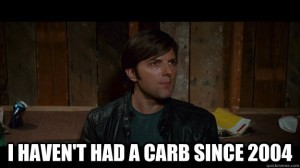Nutrition seems to be the area people struggle with the most when it comes to taking control of their health. The exercise can be fairly straight forward but not easy. For example, most people know to go for a walk, jog or a run if they enjoy that type of exercise and want to be more active. And if you go to a pool it's not hard to figure out the you start at one end of the pool and work your way to the opposite end before pushing off to return. You never see anyone get confused in a pool and try to swim cross-ways, over and under the lane ropes, rather than the way everyone has ever done it. And if you step foot in a gym littered with machines you can very easily figure out what to push or pull in order to complete a rep. And if there are free weights available you can pick the weight up and put it down. Simple as that. But nutrition gets confusing. What are macros and should I be tracking them? Should I eat 3 square meals a day or 5-6 smaller meals. Should I be low-fat or low carb? Would keto be a good option for me? What about intermittent fasting? How many calories should I eat? Should I even worry about calories? How important is protein? And can I get enough as a vegan or vegetarian? Should I be taking supplements and if so, which ones? Should I be buying organic food? Or are conventional groceries sufficient? Phew! That's a lot of questions. And those are just the main ones. There are tons we won't even go into here. For simplicity let's look at the following questions. How much should I eat? Why do I need carbs? Fats?...
Are Carbs the Cause of Obesity?
- Chris Collins
- Fitness
- 1854 Hits
- 0 Comments
-
Alright it's time for a pop quiz. And today the question is 'What's the best way nutritionally to achieve a weight loss goal?'Now depending who you talk to the answer will vary. Answers may include: keto low fat intermittent fasting cleanse or detox whole foods raw foods vegetarian vegan IIFYM (aka if it fits your macros) flexible dietingAnd there's more than this to add to the list.Get's kind of confusing doesn't it? Paralysis by analysis comes to mind.Recently a colleague shared a graph on his social media. And it caught my attention and became the foundation for this post.Here's the graph:[caption id="attachment_5560" align="aligncenter" width="300"] Carbohydrate intake and percentage of adults with obesity over time.Here's what the graph shows:One the left vertical axis is carb intake in grams/person/day. The range is from the low 400s to the mid 500s per day.On the right vertical axis is the percentage of adults with obesity.On the horizontal axis is time in years from around 1980 to 2010.Two lines are plotted on the graph. In black we can see the consumption of carbs. And a black line represents the percentage of individuals with obesity.A few observations from this graph include: Carb intake increased steadily from 1980 to 2000. From 2000 to 2010 carb intake has been on the decline. Obesity rates have increased steadily from 1980-2010 The graph is based on a certain population i.e. obese individuals. We don't know anything about the quality of the carbohydrates consumed.This now creates an interesting conversation.First of all, we understand carb intake was reduced. Was caloric intake reduced as well? Or were carb calories replaced with additional protein or fat?I haven't dug into the reference for this graph so can't comment on what else changed with the population. Has nutritional quality decreased? Have activity levels dropped off? Have sleep...
How much, what and when to eat
- Chris Collins
- Fitness
- 1933 Hits
- 0 Comments
-
Nutrition is an interesting topic. For some, they treat it like religion. But it isn't like religion at all. It doesn't matter what I believe. Instead what should matter is what the research tells us to be true. We can decide to accept science or not.Only once we move beyond the idea of nutrition as a belief system can we address any of the questions we may have with the foods we eat.And there's a particular order, or hierarchy, of how to address our nutrition. This concept was proposed by Tom Venuto and works quite well.Before we get to addressing the layers of this hierarchy of this concept we need to understand the context of the situation. For this blog we are writing with the end goal being fat loss. The prescription would differ for someone with a performance goal or looking to add lean mass.The first place to start is to answer the question 'how much should we eat?' If we get this part wrong it's a lot harder to achieve our goal and can add frustration to positive efforts.In order to determine your daily caloric requirement we need to know about the individual. The sex of the individual - Men require about 12-13% more calories than women. If you eat according to portion size this is 1/8th and can be used to estimate energy when plating out meals. The age of the individual - A younger person will require more than a older person. For adults our caloric requirement will decrease by about 3.8 cal/year. The individual's occupation - Someone with a desk job will require less nutrition than a very active occupation like a bike courier. The individual's activity - Not counting work-related tasks it helps to know if the person moves a lot or not.And as we mentioned this...
Eat Your Carbs...Except These
- Chris Collins
- Nutrition Advice
- 1739 Hits
- 0 Comments
-
When it comes to nutrition, carbohydrates are an interesting topic. You either find people fall into one of three categories when it comes to this macro-nutrient. Some will avoid carbohydrates like the plague for a variety of reasons. This could be due to an attempt to eliminate gluten from the diet, a belief that carbohydrates make us fat or for other health reasons. Others will consume carbohydrates in small quantities while only selecting the varieties believed to the healthiest. Sometimes this include carbohydrates that are gluten-free, low glycemic, organic, whole grain or simply fruits and vegetables. Lastly there are some people who don't get too excited about carbs. They will eat bread, pasta, cereal and rice without taking a special pill or scheduling an additional training session to burn off all this additional energy. Gets kind of confusing, doesn't it? What information do you follow? Do you go with what the healthiest, leanest person you know says? Do you go with whatever the newest information, i.e. a trend, is suggesting? Or something else? While this post isn't about deciphering nutritional sources to determine who or what to trust the short answer is to trust those who are the most educated in a field and where the majority of evidence points. For example, if I could follow a nutritional recommendation from a nutritionist from someone with a PhD in this field, from a scientist in another field of study or from a well-known fitness person, I'll trust the person with the PhD in nutrition. As well, if the majority of evidence, i.e. peer reviewed research, on a topic indicates a particular finding I'll usually go with that. Consideration must be given to the type of study, duration, number of subjects etc but assuming the methods are solid I'll go with what most research tells us....
When Protein + Veggies Don't Work
- Chris Collins
- Nutrition Advice
- 1791 Hits
- 0 Comments
-
Life is rarely a series of absolutes. There are few times when we always 'do this' or never 'do that'. Oftentimes an answer to a question from a client might be prefaced with 'it depends...'.And this is not meant to be a cop out. For example let's look at a few examples.If a young athlete asks if they should be taking a particular supplement the answer might begin with 'it depends'. How old is the athlete? What does their nutritional profile look like? Is the supplement being considered safe and effective? And are there other ways to achieve the same outcome by tweaking the athlete's eating habits before investing in a supplement?Or another client might ask if they should add sprints to their training program to enhance fat loss. Rather than a outright yes or no we might ask the client if they have any current joint pain or injuries. Sprinting puts exceptional stress through the feet-ankles-knees-hips and low back. An individual with current issues at these joints may realize additional pain and problems from an activity with high velocity and impact.Additionally we might want to know how this person moves? Have they already been doing some high speed running? How old is the client that is considering sprinting? What type of footwear and surface will they be sprinting on? And what other training will this individual be doing in the days prior and after some sprint training?In other words this is not Vegas and simply a condition of whether or not to double down on 11. It's not that cut & dry.[caption id="attachment_4530" align="aligncenter" width="300"] One of the few absolutes in life.Consider as well the notion to eat only protein and veggies.On the one hand this sounds very simple and possibly effective in terms of a healthy nutritional approach. By eating...
Top 7 Nutritional Fails
- Chris Collins
- Nutrition Advice
- 1745 Hits
- 0 Comments
-
Whenever we have an inquiry from a client interested in training at Okanagan Peak Performance Inc we sit down and do a strategy session with them. We want to learn about their goals, their training history, where they have aches and pains and what their recovery is like. Once we know these things we can much more effectively provide a personalized plan for that individual to help them achieve their goal(s) in less time.And one of the most common areas people need help with achieving their goals is with regards to their nutrition. After meeting with hundreds of clients, athletes and teams over the years I can say there are a number of common areas where people get tripped up with respect to their nutrition.With that in mind here are the Top 7 Nutritional Fails.1. Not Eating Enough Fruits & VegetablesThis should come as no surprise to anyone. Yet what is surprising is that even though most people are aware that they aren't eating enough fruits and vegetables they are surprised that they haven't achieved their ultimate physique or performance. On the one hand they recognize how vital these foods are to attaining their goal but then they fail to make the connection between this and the fact they are in poor health, obese or under performing in competition as a result.2. Missing One of D/Q/TThis one doesn't mean you are missing a Dairy Queen treat. Instead it refers to Dose, Quality and Timing. Most people do two of these really well. For example, they may eat the right amount of calories, and it's all high quality nutrition but it's all at one meal and so the timing is not ideal.Or someone might eat quality foods at the right times but just not eat enough total calories.Lastly, there maybe a situation where someone...




